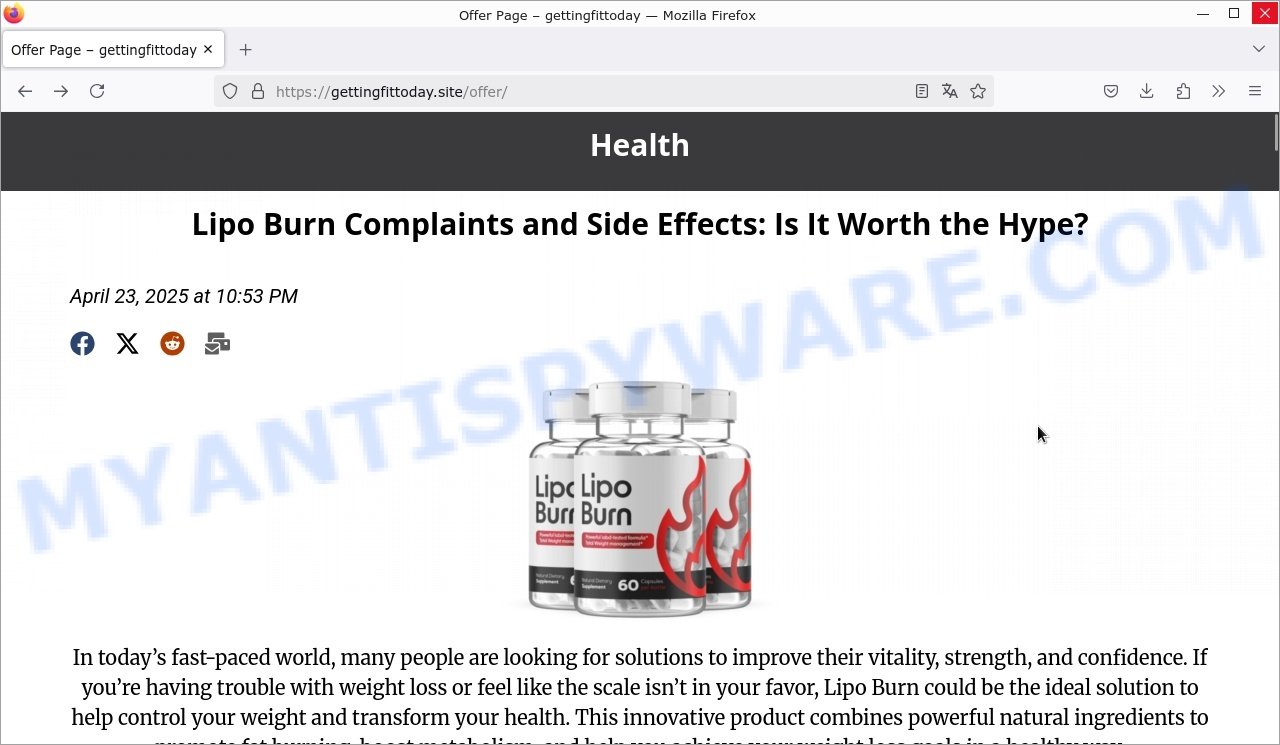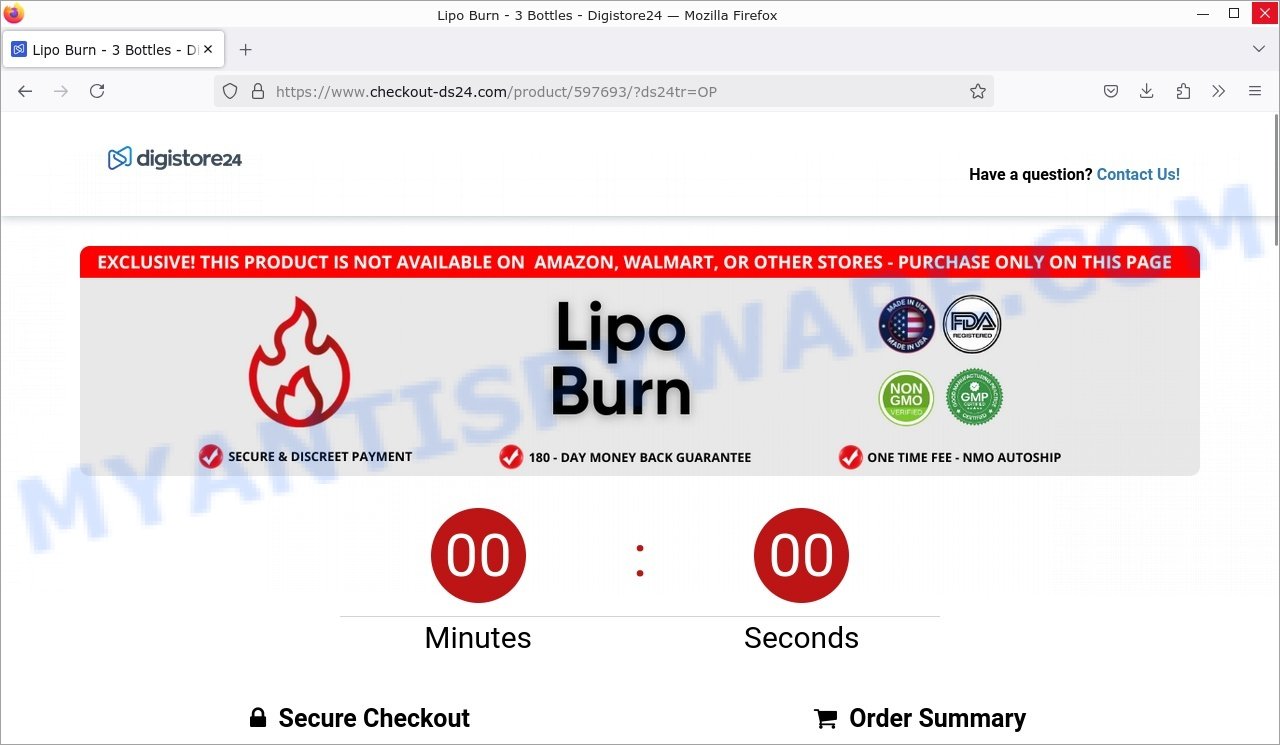Scammers are aggressively pushing the so-called Pink Salt Ice recipe for Weight Loss & Lipo Burn — a “miracle” solution that promises to melt away fat in just 21 days with nearly no effort. Advertisements on Facebook and other social platforms feature flashy videos, bogus celebrity endorsements (even a clip that falsely appears to show Oprah Winfrey recommending the recipe), and outrageous claims like triggering a “space-rocket metabolism” that lets you burn fat while still enjoying pizza and hot chocolate. These promises are designed to capture your attention and lure you into trying the product.

Just like other scammy weight-loss fads, the marketing is full of unrealistic success stories—people claiming their body transformed overnight, shocking friends and getting viral attention—all without any solid scientific backing. The product’s website flashes terms like “100% All Natural” and “Manufactured in a FDA Registered Facility”, yet critical details are hidden in images or vague text, making it nearly impossible to verify any claims. References to research from prestigious institutions like Johns Hopkins and Harvard are mentioned without any real studies or links to support them.
The tactics are classic scam maneuvers: high-pressure sales messages, a brand-new website designed to look trustworthy at first glance, and incredible discount offers that rush you into making a purchase before you have a chance to do proper research. These red flags—fake endorsements, impossible weight-loss promises, and misleading practices—point to an offer that is more about exploiting hope for quick fixes than about real, sustainable health improvements.
Before you consider trying Pink Salt Ice or Lipo Burn, remember that effective weight loss typically comes from a balanced diet, regular exercise, and guidance from reputable healthcare professionals—not from miracle recipes promoted on social media. If something sounds too good to be true, it usually is. Protect your health and your wallet by steering clear of these deceptive claims and do thorough research before giving any personal or payment information.
Table of Contents
🚨 Is the Pink Salt + Ice / Lipo Burn Miracle Recipe a Scam?
The so-called “Pink Salt + Ice” recipe and the Lipo Burn supplement are being pushed with flashy social-media ads and deceptive claims that suggest you can “melt fat effortlessly”, even while still enjoying pizza and hot chocolate. In reality, these offers feature tactics that are typical of weight-loss scams—promising miracles with no scientific backing and using pressured sales to lure in unsuspecting customers.
Key Red Flags:
- 🌐 Shady Promotional Channels: Advertisements for the Pink Salt + Ice recipe and Lipo Burn often appear on questionable Facebook profiles, disposable domains, and through secretive affiliate pages. These channels are known for misleading visuals and overhyped promises, designed to catch consumers off guard.
- ⭐ Fake Endorsements and Testimonials: The campaign includes videos that falsely suggest celebrity endorsements—like an alleged Oprah Winfrey clip—and overly positive testimonials from users with “miraculous” 21-day transformations. These success stories are unverified and likely created to mislead potential buyers.
- 🔒 Misleading Website Claims: The official sales pages make bold promises of rapid weight loss, automatic fat burning, and increased energy—with “scientific research” cited from prestigious institutions. However, the fine print reveals that these claims are not FDA-approved and lack independent clinical evidence.
- ⚠️ Exaggerated Health and Weight Loss Claims: Advertisers claim that the Pink Salt + Ice recipe combined with Lipo Burn can “launch your metabolism like a SpaceX rocket” and yield extraordinary results—even in individuals with no significant lifestyle changes. Such dramatic claims overwhelmingly violate safe advertising practices.
- 📉 Dubious Website Quality and Redirects: Clicking on the ads leads you through multiple dubious domains and confusing pages that mimic trusted health sites. This scattershot landing page setup is a common scam tactic aimed at preventing easy fact-checking.
- 👤 High-Pressure Sales Tactics: The offer is buttressed by pressure tactics such as steep “discount” alarms, limited-time offers, and countdown clocks that remain at “00:00.” These artificial scarcity methods are designed to force impulsive buying before consumers can critically review the claims.
- 🔗 Questionable Use of Science: The promotions mention alleged endorsements from Harvard and Johns Hopkins with no reference to any genuine study, aiming to artificially boost the product’s credibility despite the lack of tangible evidence.
In summary, the overwhelming number of red flags—from fake celebrity endorsements and exaggerated health claims to poor website quality and high-pressure sales tactics—strongly suggest that the Pink Salt + Ice and Lipo Burn offers are part of a weight-loss scam. These products rely on deceptive marketing rather than proven, sustainable health solutions. It is highly advisable to avoid these products and instead consult licensed healthcare professionals for safe and evidence-based weight management strategies.
🕵️♂️ How the Pink Salt + Ice Weight Loss Scam Operates
Scammers behind the Pink Salt + Ice and Lipo Burn offers start by flooding social media platforms—think Facebook and Instagram—with eye-catching ads and sponsored posts. These posts boast miraculous weight loss results, promising rapid fat melting, boosted metabolism, and a total body transformation—from losing weight while enjoying pizza and hot chocolate to reaping viral fame within just 21 days. The posts even feature videos that seem to show celebrities like Oprah endorsing the “secret” recipe, a claim that, in reality, is completely concocted.

When curious users click on these ads, they’re whisked away to low-quality websites that mimic trusted health blogs. Instead of standard verifiable content, the sites use static images and flashy graphics designed to confuse anyone attempting to check the facts. By imitating the look of credible health portals and using testimonials that claim thousands of five-star reviews, the scammers create an illusion of authority—even though reputable review sites like Trustpilot either show no history or reveal obvious inconsistencies.

A typical tactic involves sham endorsements and bogus badges like “FDA Registered” or “GMP Certified”, even though dietary supplements and so-called “recipes” like Pink Salt + Ice are never certified by such organizations. The scammers pile on urgency with countdown timers, messages such as “Limited Time Offer” or “Only a Few Bottles Left”, and dramatic before-and-after stories that force consumers into making snap decisions. Deep discounts and “risk-free” money-back guarantees are touted, yet the refund process is convoluted, sometimes nonexistent, leaving buyers feeling cheated.

After a purchase is made—often through a sketchy checkout process provided by third-party payment hubs—the scammers don’t stop there. They attempt to upsell additional products and memberships, disguising hidden recurring charges as “extra savings” or “free shipping bonuses”. Unsuspecting consumers later report unauthorized fees and poor customer support, finding themselves trapped by the endless cycle of deceptive upsells.
In short, the Pink Salt + Ice and Lipo Burn scam thrives on slick social media ads, fake celebrity and “expert” endorsements, and elaborate website designs that mimic legitimate health sites. By leveraging misleading scientific-sounding claims, overhyped testimonials, and aggressive scarcity tactics, these fraudsters lure people desperate for a quick weight loss fix—only to leave them disappointed, out of pocket, and questioning every promise made.
Remember: if it sounds too good to be true, it probably is.
🤔 Why Such Scams Are Possible
Quick Profit Motive
Scammers behind the Pink Salt + Ice and Lipo Burn offer want to earn money fast. They push claims that seem too good to be true, like melting fat quickly, while using a fake video that looks like a famous person is giving advice. This fast cash method tricks people into believing something that is not real.
Limited Oversight on Ad Platforms
Social media and ad networks try to block misleading ads, but they cannot catch them all. As a result, ads showing recipes and miracle cures like these can be seen by many people who are searching for quick fixes to lose weight, even though the products are harmful or fake.
Exploiting Human Psychology
The promoters of these offers know that many people want to lose weight quickly with little effort. They use stories of dramatic weight loss, such as melting fat while still eating pizza, and claim that even a 56-year-old saw great changes. This false hope makes consumers ignore warning signs and buy into the scam.
Lack of Real-World Footprint
These scams use new or fake websites that offer huge discounts and pressure customers with countdown timers. They do not have a clear business address or genuine customer reviews. The claims are often supported by made-up research from well-known institutions with no real links. This lack of transparency makes it hard to hold anyone accountable if the scheme fails.
Misuse of Trusted Platforms
Although the scammers sometimes use legitimate payment processors like Digistore24, they hide behind these systems. This makes the deal seem official, even though the product is sold through a disposable website with no real customer service. This extra layer of deception hides the truth, reducing the chance of immediate legal action.
Pressure Tactics and False Guarantees
These ads often show a video that claims a famous personality endorses the product and uses extreme before-and-after stories to create urgency. Sales pages use big discounts and limited-time offers that push people to act without checking details. This pressure can lead buyers to give up personal and payment information without a second thought.
😱 What to Do If Scammed
If you find yourself ensnared by the Pink Salt Ice recipe for Weight Loss Scam, immediate action is crucial. Here’s what you should consider doing:
🛑 Stop Further Transactions
The first step is to halt any additional transactions that might be in process. Contact your bank or credit card provider and inform them that you’ve fallen victim to a scam. They can help by blocking the card or reversing any unauthorized transactions.
📞 Report the Fraud
File a report with your local police and provide all the available evidence, such as screenshots, emails, and website URLs. Additionally, report the scam to online portals like the Better Business Bureau (BBB) at www.bbb.org or the Federal Trade Commission (FTC) at reportfraud.ftc.gov. If you’re in another country, reach out to your national consumer protection agency.
💻 Take Screenshots
Before the scam website gets taken down or changes, make sure to capture screenshots of your transactions and communications. These can serve as evidence if you decide to pursue legal action.
⚖️ Consult Legal Advice
Speak to a legal advisor about your situation. While pursuing legal action may be time-consuming and costly, it could be a possible avenue for recovering your lost money.
📢 Share Your Experience
Use social media platforms to share your experience and warn others about the scam. Your story could prevent someone else from falling victim to the same or similar scams.
Summary Table
| Factor | Observations | Impact on Legitimacy |
|---|---|---|
| Product Description | The offer promotes a Pink Salt + Ice recipe and a product called Lipo Burn that claim to deliver fast weight loss and fat burning with little effort. It uses wild claims like burning fat while still eating pizza. | Negative (Overblown claims without proper support) |
| Celebrity Endorsement | A video falsely suggests that Oprah Winfrey is endorsing this weight loss trick. There is no proof from her official site or social media confirming such an endorsement. | Negative (Fake celebrity endorsement to gain trust) |
| Marketing Channels | The product is pushed through Facebook ads and social media videos that use urgent messages and flashy discounts. The video uses a countdown timer and bold claims to push consumers into a quick decision. | Negative (High-pressure tactics and misleading social media promotion) |
| Customer Reviews | The website shows glowing testimonials and high ratings, yet there is no trace of these reviews on trusted sites like Trustpilot or Amazon. | Negative (Absence of independent and verifiable reviews) |
| Pricing and Discounts | There is a dramatic price drop from a high “original price” to a much lower price, together with claims of limited stocks to force hasty decisions. | Negative (Unrealistic discount claims and pressure selling) |
| Website Transparency | The domain (gettingfittoday.site) was only recently created. Contact details are hidden behind privacy services and there is no clear physical address or customer service phone. | Negative (Lack of transparency and new, disposable website) |
| Misuse of Science | The claims are backed by references to studies from big names like Harvard and Johns Hopkins without linking to any proper evidence or scientific research. | Negative (Unverified scientific claims to seem credible) |
| Checkout Process | The purchase is made through an affiliate payments page (via a platform like Digistore24) that is often used for similar scams. This increases the risk of falling victim to a fraudulent offer. | Negative (Risky payment process and affiliate scam techniques) |
| Refund Policy | There is no reliable information on how refunds are handled. Customers who have bought similar offers report difficulty or inability to recover their money. | Negative (Unclear or misleading refund practices) |
| Overall Legitimacy | The combination of fake endorsements, exaggerated claims, hidden site details, and a high-pressure sales method all point to a typical social-media weight loss scam. | Negative (Multiple red flags confirming a scam) |
Conclusion
The Pink Salt + Ice weight loss “miracle” and the Lipo Burn supplement are nothing more than clever scams designed to trick you into believing in effortless, rapid fat loss. These gimmicks rely on sensational claims, fake celebrity endorsements, and manipulated “scientific research” to create a false sense of legitimacy.
From the bogus video allegedly featuring Oprah Winfrey to outlandish promises like melting fat while eating your favorite foods, these products prey on your desire for a quick fix. The disposable website, flash sales, and artificially low prices are classic high-pressure tactics meant to rush you into a purchase before you have a chance to question the claims. Moreover, the use of misleading statements—such as exaggerated results in just 21 days and baseless endorsements from supposed experts—is a well-worn playbook of social-media weight loss scams.
Bottom Line: Avoid the Pink Salt + Ice recipe and Lipo Burn supplement at all costs. If an offer sounds too good to be true or heavily depends on misleading tactics, manipulated testimonials, and fake authority claims, it’s most likely a scam. Protect your health and your wallet by doing thorough research and steering clear of these deceptive products.













